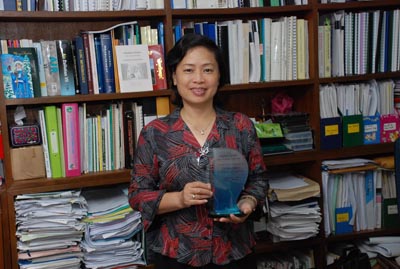
One of AIT’s leading climate change experts, Associate
Professor N. T. Kim Oanh, (pictured above with her award) was
recently honored by her peers from around Asia for her proactive
academic contributions to the study of air quality and atmospheric
pollution.
Dr. Kim Oanh was awarded the “Extra Mile” special award at the Better Air Quality 2008
(BAQ08) conference series organized from November 12-14 in Bangkok,
Thailand. The BAQ is the biggest conference series on air quality
management in Asia, annually bringing together policy makers and
stakeholders to discuss how to improve the quality of air in Asia's
cities.
This year’s series of presentations attracted over 1,000 researchers
from across the region, and some from other parts of the world. The BAQ
2008 theme was “Air quality and climate change: scaling up win-win
solutions for Asia.” The judges were particularly impressed by
the number of abstracts submitted by the AIT graduate students
supervised by Dr. Kim Oanh.
“The quality and number of the presentations made by our AIT air
quality group yielded earned me the award, I would like to thank all my
students and research staff for their commitment in doing good research
for AIT,” Dr. Kim Oanh said.
A faculty member of the Environmental Engineering and Management
(EEM) field of study at the School of Environment, Resources and
Development (SERD), Dr. Kim Oanh’s main areas of expertise are air
pollution, environmental monitoring and modeling, exposure assessment,
industrial environment management, climate change.
She currently teaches graduate courses in air pollution and air
quality management, air pollution modeling and applications, design for
air pollution control systems, receptor modeling for air pollution
source apportionment, and sampling design.
A native of Vietnam, Dr. Kim Oanh received her doctorate of
engineering in Environmental Technology and Management at AIT in
1994, having graduated earlier from AIT with an M.Eng in 1991.
At the conference, Dr. Kim Oanh's plenary presentation was titled
“Black carbon in ambient air and climate change implication: long term
data in six Asian cities.” The rest of the AIT team contributed a total
of 5 oral presentations, out of around 200 oral presentations at
different workshops.
By displaying 9 posters to the audience (out a total of 80 poster
presentations), the EEM/AIT Ph.D and master’s students were the leading
delegation in terms of presentations, organizers said.
Team AIT also presented the latest research of the EEM/AIT group
focused on toxic air pollutants and their effects, in particular the
relationship between air pollution and climate. In her plenary speech,
Dr. Kim Oanh highlighted the importance of addressing the situation of
black carbon particulates in the air.
She made the point that tiny particles in the air are the most
detrimental air pollutant from a health point of view, and are believed
to cause 2-5% of total deaths in urban areas of developing countries.
These particles also interact directly and indirectly with the earth’s
radiation energy balance and can subsequently affect global climate
patterns, Dr. Kim Oanh said.
The types and degree of potential effects of these particles, however,
depends on their chemical and physical properties. Dr. Kim Oanh
explained that black particles (BC) normally carry with them a range of
carcinogenic pollutants and are at the same time a strong climate
forcing agent. The global warming potential of BC is around 2000 times
of that of carbon dioxide (on a mass basis), over a 20-year time span.
Under the framework of the air pollution project of the Asian Regional
Research Program on Environmental Technology (ARRPET), which is
sponsored by Swedish International Development Agency and housed at
AIT, these particles have been monitored in many Asian cities for
almost eight years. Based on the findings of this project, it is clear
that high levels of particles and BC in the ambient air of the cities
call for emissions reductions, Dr. Oanh told the conference.
“Black carbon: air quality and climate change issue” was also the
theme of a special workshop coordinated by the AIT air quality group.
This workshop outlined the ongoing research collaboration between AIT,
Tokyo University and Hanoi University of Science, conducted under the
framework of the Asian-Pacific Network for Global Change project
“Investigation on the impacts of urban-rural air pollution on air
quality and climate in Southeast Asia,” which is managed by Dr. Kim
Oanh.
